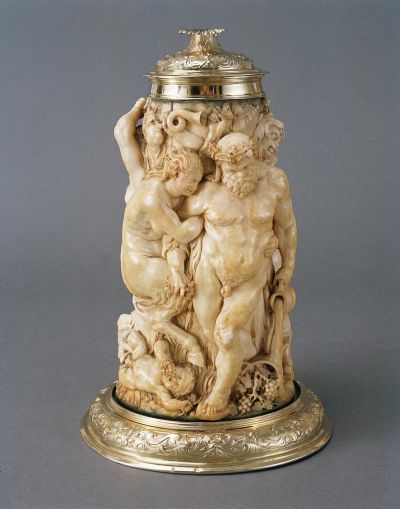
Tankard with cover - with the drunken Silenus
| Accession Nr.: | E 66.1 |
|---|---|
| Artist/Maker: |
Petel, Georg (1601 - 1634) / bone carver, bone sculptor Wickert, Andreas (1600 - 1661) / goldsmith |
| Date of production: |
ca. 1630
1625-1650
|
| Place of production: | Netherlands |
| Inscription: | augsburgi városjegy és AW (Andreas Wickert) mesterjegy (ld. Seling 1451, 69,) Seling 1980 1. kötet, p. 110-111.; p. 277-278.; II. kötet 417. kép |
|---|---|
| Materials: | ivory; silver-gilt |
| Techniques: | carved; chiselled; embossed |
| Dimensions: |
height: 27,8 cm
base diameter: 17,5 cm
|
The cylindrical cup rests on an oval base, the body carved in ivory with a scene of the drunken Silenus supported by satyrs, putti and a female figure leading a child in a shirt. This relief is based on an engraving, The Drunken Silenus, by Williem Panneels (c. 1600- after 1632), a pupil of Rubens, of around 1630, which derived from a painting of the same subject by Rubens himself of 1618, now in the Alte Pinakothek, Munich. There are makers' marks on the rim of the cover and the foot.
Georg Petel was noted for his ability to carve compositions made up of a mass of intricate detail on small ivory surfaces. He spent several years in Italy and Antwerp in the 1620s before settling for the last decade of his life in Augsburg.
The cover lost its finial sometime before 1923, when it was recorded in its current state.
A similar carved ivory vessel in the Kunsthistorisches Museum, Vienna, was made by Lucas Faydherbe (1617-1697), another pupil of Rubens. Its lid features a sculpture in the round of a child eating grapes. It seems likely that the tankard in Budapest would have had a similar ivory sculpture on its cover.
Georg Petel was noted for his ability to carve compositions made up of a mass of intricate detail on small ivory surfaces. He spent several years in Italy and Antwerp in the 1620s before settling for the last decade of his life in Augsburg.
The cover lost its finial sometime before 1923, when it was recorded in its current state.
A similar carved ivory vessel in the Kunsthistorisches Museum, Vienna, was made by Lucas Faydherbe (1617-1697), another pupil of Rubens. Its lid features a sculpture in the round of a child eating grapes. It seems likely that the tankard in Budapest would have had a similar ivory sculpture on its cover.
Literature
- Szerk.: Szilágyi András: Műtárgyak a fraknói Esterházy-kincstárból az Iparművészeti Múzeum gyűjteményében. Iparművészeti Múzeum, Budapest, 2014. - Nr. V.11. (Rákossy Anna)
- Szerk.: Szilágyi András: Esterházy-kincsek. Öt évszázad műalkotásai a hercegi gyűjteményből. Iparművészeti Múzeum, Budapest, 2006. - Nr. 108. és kép (Rákossy Anna)
- Szerk.: Szilágyi András: Hungary's heritage: princely treasures from the Esterházy Collection from the Museum of Applied Arts. Paul Holberton, London, 2004. - Nr. 36.
- Szilágyi András: Az Esterházy-kincstár. Helikon Kiadó, Budapest, 1994. - p. 43.
- Szerk.: Szilágyi András, Péter Márta: Barokk és rokokó. Az európai iparművészet stíluskorszakai. Iparművészeti Múzeum, Budapest, 1990. - Nr. 3.2. (Szilágyi András)
- a kiállítást rendezte: Ács Piroska: Augsburgi barokk ötvösmunkák. Iparművészeti Múzeum, Budapest, 1984. - Nr. 21.
- Szerk.: Miklós Pál: Az Esterházy-gyűjtemény. Az Iparművészeti Múzeum gyűjteményei. Magyar Helikon, Budapest, 1979. - 12. kép (Héjjné Détári Angéla)
- Szerk.: Galavics Géza: A fraknói Esterházy-kincstár a történeti források tükrében. Magyarországi reneszánsz és barokk. Művészettörténeti tanulmányok. Akadémiai Kiadó, Budapest, 1975. - és 18. kép (Héjjné Détári Angéla)
- Szerk.: Radocsay Dénes, Farkas Zsuzsanna: Az európai iparművészet remekei. Száz éves az Iparművészeti Múzeum. Iparművészeti Múzeum, Budapest, 1972. - Nr. 194.
- Layer Károly: Az Országos Magyar Iparművészeti Múzeum gyűjteményeinek leíró lajstroma műtörténeti magyarázatokkal. Iparművészeti Múzeum, Budapest, 1927. - p. 51.
- Layer Károly: Das Ungarische Kunstgewerbemuseum: Illustrierter Führer durch die Sammlungen. Királyi Magyar Egyetemi Nyomda, Budapest, 1925.

